View from the Bus – A Tour of Protected Land
If you live in a city or suburb and don’t travel off your beaten path, it’s easy to forget how rural much of the surrounding area is. Protecting this land – including farms to relatively untouched natural areas – is the mission of the Washtenaw Land Trust, and on Saturday afternoon about 50 people boarded a bus to see some of the work they’ve done toward that goal. The Chronicle went along for the ride.
The group met at the county’s service center on Zeeb Road, then took the bus west before heading south on Parker Road. As we left the suburbs and passed through fields of dried corn stalks and the occasional herd of sheep (and at least one llama), Suzie Heiney, the trust’s development director, pointed out the significance of what we were seeing and how it fit into the goal of land preservation:
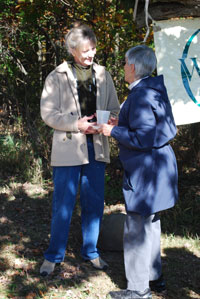
Connie Ludwig, left, who with her father Bob owns 167 acres in Freedom Township that's protected through a conservation easement.
- If there’s a silver lining in the current housing market, it’s that the pressure to sell land to developers has eased somewhat. Now, farmers are more likely to consider other options, such as creating a conservation easement, which limits the amount of development that can be done on the site in exchange for certain tax benefits.
- The Washtenaw Land Trust partners with other preservation initiatives, including the city of Ann Arbor’s greenbelt program. Last year, 10 groups formed a collaborative called Preserve Washtenaw, which meets regularly to coordinate their efforts.
- Through the trust’s 71 projects, 3,711 acres have been protected in this area. That includes the Parker farm’s 188 acres, which has been in that family since the 1830s. It also includes the Ludwig farm on Bethel Church Road, which was the tour’s first stop.
Connie Ludwig and her father Bob Ludwig own 167 acres of rolling fields and woods in Freedom Township, and last year signed a conservation easement for the property.
As we pulled into the farm, someone on the bus said to her seatmate: “I love it out here, but what would you do all day?”
For an hour, at least, what we did was enjoy cider and donuts from Alber Orchard and Cider Mill – you could see the orchard’s apple trees across the road from the Ludwig farm.
And for part of that time, Peter DeLoof – a land trust board member – took the group for an old-fashioned hay ride, using an well-preserved red tractor that had surely not hauled a friendlier load.
The sharp scent of hay on a crisp autumn day, coupled with the rural vista of burnished woods and romping quarter horses, “does the soul good,” as one person mused.
While we were there, we also heard from Susan Lackey, the trust’s executive director, who took a moment to do some well-deserved back-patting: The Washtenaw Land Trust is one of only 39 trusts accredited this year under a new national accreditation program.
She also noted that because the board has expanded the trust’s geographic reach to include Jackson County, the organization will be changing its name within the next few months to reflect that broader mission. No word on what that new name will be.
We also had time to chat with the bus driver for the group, Kim “My friends call me Ketch” Ketchpaw. He grew up in the Ann Arbor/Ypsilanti area during the 1960s and shared some stories with The Chronicle about musicians he saw at local “teen clubs,” including the Yardbirds, Ted Nugent and Iggy Pop. He also recalled watching war protests on the UM campus, most memorably a time when students were throwing IBM Selectric typewriters out of windows at the LS&A building. (It’s worth noting that Ketch received two separate rounds of applause from riders during the trip, both times when he made particularly difficult turns without plowing over a post in one case or a sign in another.)
Soon it was time to reboard and head north on M-52, then west on I-94 to Exit 150, and into the Waterloo Recreation Area. We skirted the southern edge of this expansive 20,000-acre park, and learned that it’s the largest public park in the Lower Peninsula. The trust looks for properties it can help preserve adjacent to Waterloo, or near the Sharonville State Game Area to the south and the Pinckney Recreation Area to the north – creating a natural corridor of open space and farmland.
On the western border of Waterloo is the Sandhill Crane Vineyards, our next and final stop on this tour. They make 27 different varieties of wine and embrace the goal of buying local, according to Heather Price, whose family owns the business. Despite the chill in the air, many of the vines were still laden with grapes. But most people stayed out of the vineyards and took advantage of the free wine tasting – and by the end of the hour, the line at the winery’s store was long.
The point of having Sandhill Crane Vineyards on this bus tour – as well as Alber Orchard snacks at the Ludwig farm – was to connect us with an active agricultural enterprise, and to show us the value that these land-based businesses have to our community. And ultimately, of course, to help us appreciate the importance of making sure these places can be sustained. It’s unlikely that anyone on the tour needed convincing. But they likely came away with a better understanding of local land preservation issues, and of the Washtenaw Land Trust’s role in safeguarding rural areas for future generations.





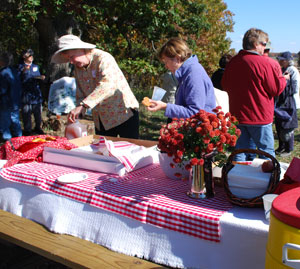

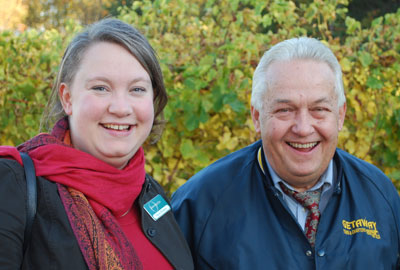
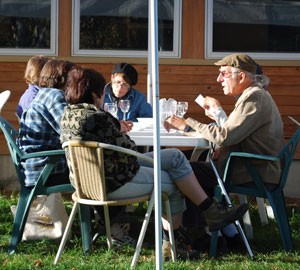
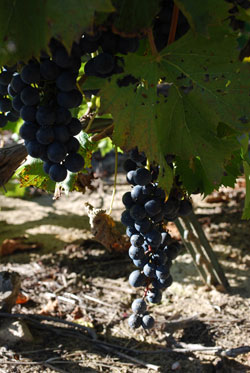
The Washtenaw Land Trust and the other land preservation groups in Washtenaw County are doing a wonderful job. I would just like to remind folks that they are partners with government funded programs (Natural Areas – Washtenaw County, the Greenbelt – City of Ann Arbor, and millages for land preservation in Ann Arbor, Scio, Superior and other local townships). So, your tax money is also going to preserve land. The county has preserved over 1300 acres since the Natural Areas millage was passed in 2000. This is a wonderful example of a successful public/private partnership. Special thanks to Susan Lackey and her efforts to bring everyone together.
Twenty-five years ago a local real estate agent scoffed at our efforts to preserve farm land. He promised that if we managed to preserve one acre he would donate ten. I have yet to see Ed come through with his side of the bargain.